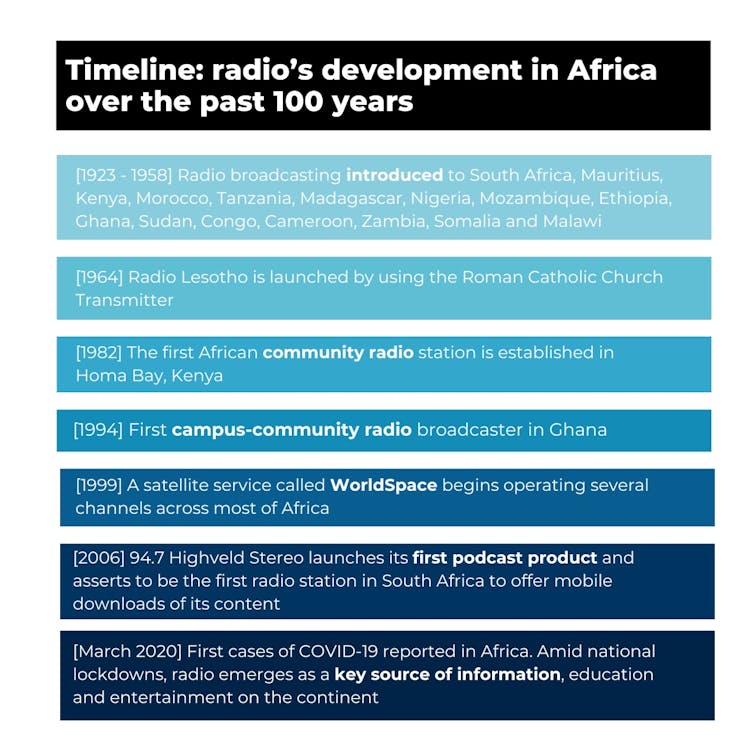Radio is thriving across Africa. Exact figures are difficult to come by because audience research differs across countries. But studies estimate radio listenership to be between 60% and 80% of the continent’s 1.4 billion population, write Sisanda Nkoala, University of the Western Cape; Christina Chan-Meetoo, University of Mauritius; Jacinta Mwende Maweu, University of Nairobi; Marissa J. Moorman, Indiana University; Modestus Fosu, Ghana Institute of Journalism, and Stanley Tsarwe, University of Namibia
In contrast to many western countries, where there has been a shift towards streaming and podcasts, traditional radio continues to be widely embraced in Africa. Because of poor literacy levels and uneven access to the internet and technological infrastructure, old-fashioned radio remains a reliable and inclusive medium.
This year’s celebration of the 100-plus years of radio offers us an opportunity, as African media scholars, to reflect on the historical significance, cultural relevance, political power and social impact of the medium on the continent. We home in on examples from the regions we’ve studied to demonstrate this rich history.
Early years
The story of radio in Africa starts with its introduction to serve colonial interests. Cameroonian scholar Francis Nyamnjoh argues that as soon as it had established itself as a mass medium in the 1920s,
European states were quick to realise the part radio could play in realising their desire to swallow up weaker cultures around the globe.
Historians note that it also allowed Europeans in the colonies to connect to home, their culture and their languages.
In the early 1920s amateur radio enthusiasts had already begun tinkering with the technology. The first official broadcast seems to have been on 18 December 1923 in Johannesburg, South Africa.
In east Africa, radio was first introduced in Kenya in 1927 and in west Africa to Sierra Leone in 1934.
UK media scholar Graham Mytton writes that the arrival of radio in west Africa’s British colonies – The Gambia, Sierra Leone, Gold Coast (now Ghana) and Nigeria – marked a turning point.
Until then radio had been broadcast by wireless transmission. When it was introduced in Sierra Leone, Ghana (1935) and Nigeria (1936), it was “via wired services – subscribers had loudspeakers (linked by wire to the radio station) installed in their homes to receive the service … these were created with native African listeners in mind”.
Then, in 1936, the British colonial administration decided to develop radio broadcasting throughout its African colonies.
Propaganda
Colonial powers such as the UK and France upped their radio transmission efforts after the outbreak of the second world war in 1939. The 1940s were marked by the introduction of indigenous language broadcasts by colonial powers wanting to influence public opinion and garner support for their war effort. While the British broadcast to Africa in some African languages, France broadcast only in French.
This laid the groundwork for future developments. After the war, the British officially adopted a policy of extending broadcasting services across most of its African colonies.
In Kenya, for example, the first broadcast service for Africans began in 1953, transmitting in local languages during the state of emergency declared in 1952 to suppress the Mau Mau uprising.
Academics have argued that despite being designed mainly for propaganda, radio in Africa
was always far more multifaceted and slippery than was intended by colonial powers.
It also offered the “ability to create new and sometimes unruly publics”.
Resistance radio
The 1950s saw the expansion and transformation of radio in Africa. Radio stations across British, French and Belgian colonies rapidly increased as people under colonial rule increased their efforts to achieve independence.
In the mid-1950s the oldest liberation station in Africa, Radio Freedom, was established as an underground station in Zambia by South Africa’s resistance movement. It would air its first formal broadcast in 1963.
In Angola, radio expanded with the outbreak of war in 1961 between liberation movements and the Portuguese colonial state.
Liberation movements in neighbouring countries used radio for war reporting amid colonial censorship. For their part, colonial state radio fostered the emergence of local artists’ music as part of their colonial propaganda.
Independence and state control
From the late 1940s to the early 1960s the number of radio-receiving sets increased fivefold, from 90 sets per thousand people in Africa to 450.
In some respects the 1960s was a golden era for African radio. A wave of independence movements birthed new nations as radio technology was becoming more affordable.

Many newly independent countries established national broadcasting services, like The Gambia in 1965. This expanded the reach of radio and the opportunity to embrace local languages, music and cultural programming. In Nigeria, the Broadcasting Corporation expanded to cover the whole country.
But some newly independent countries that had inherited state-controlled broadcasting systems also censored content deemed critical or threatening, restricting freedom of expression.
With independence in Angola in 1975, for example, the new leaders saw radio as a tool for nation building, but tightened their grip after a coup attempt in 1977.
In many African countries, Angola included, post-colonial state control of radio continues. Zimbabwe’s radio sector, for example, is thriving. But state control remains strong, with biased licensing for national radio and restrictive laws for community radio stations.
The Mauritius Broadcasting Corporation was established in 1964 and still operates as a state broadcaster. Despite funding through public licence fees and advertising, it’s perceived to promote government agendas.
Radio has also been used to promote nefarious political ends. The 1994 genocide in Rwanda stands as a painful example. The infamous Radio Télévision Libre des Mille Collines disseminated hate speech and incited violence against the Tutsi minority.
Private commercial stations
Over the last 40 years many African countries have liberalised their economies and their media regulations, issuing commercial and community radio licences.
In Ghana, for example, radio primarily served elite interests until the 1990s, when private ownership diversified the industry. By 2022, Ghana boasted 513 radio stations, ranging across public, commercial, community, campus and foreign broadcasts.
An essential development has been the emergence of indigenous language radio. This has produced culturally resonant content and prioritised community issues. But challenges persist. Some stations are affiliated with political or business interests and increased attacks on journalists pose risks to media freedom and diversity.
In recent decades, Kenya’s radio landscape has transformed to over 200 stations. Private commercial stations now dominate, broadcasting in local languages.
In Mauritius, airwaves were liberalised in 2002, introducing private stations. Talk shows, especially in the Mauritian Creole language, have revolutionised radio. Private radio has expanded to digital platforms, engaging audiences through live streams and social media, creating both competition and sensationalist coverage.
Radio now
Digital convergence is reshaping radio consumption, blurring audience patterns.
This isn’t happening uniformly across the continent. Digital platforms face challenges, such as the digital divide and economic inequality.
Radio’s influence is likely to endure, with podcasts complementing rather than replacing traditional broadcasts. A 2022 survey across 34 African countries found radio was “overwhelmingly the most common source for news”. This is a testament to its enduring influence and unique ability to connect with diverse audiences – even a century after its introduction.![]()
Sisanda Nkoala, Associate professor, University of the Western Cape; Christina Chan-Meetoo, Senior Lecturer in Media and Communication, University of Mauritius; Jacinta Mwende Maweu, Senior lecturer in Philosophy and Media Studies, University of Nairobi; Marissa J. Moorman, Associate Professor of History, Indiana University; Modestus Fosu, Associate Professor in Language and Communication Studies, University of Media, Arts and Communication, Ghana Institute of Journalism, and Stanley Tsarwe, Lecturer in Journalism, University of Namibia
This article is republished from The Conversation under a Creative Commons license. Read the original article.














